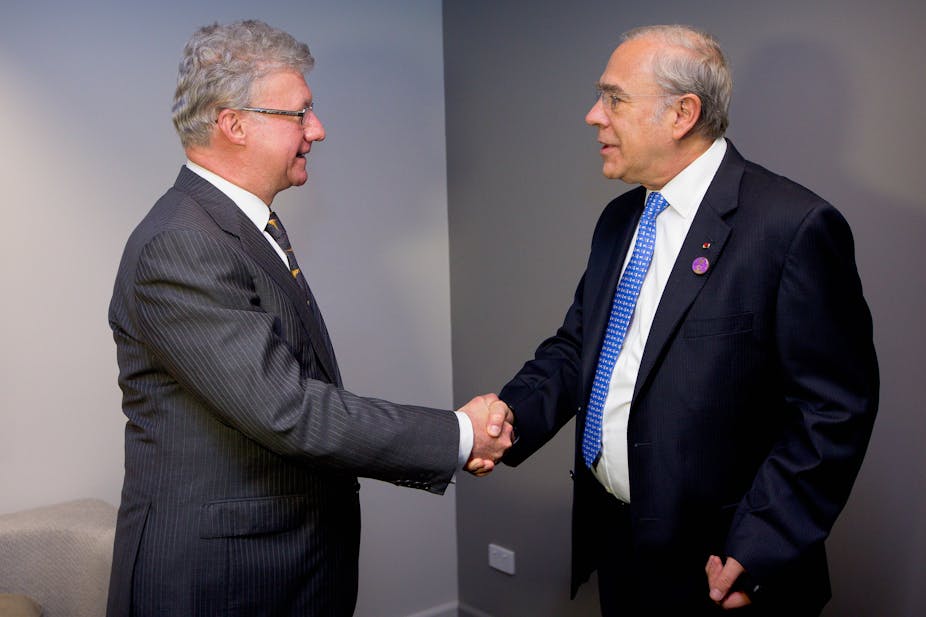The G20 summit must “go structural, go social and go green”, says OECD secretary-general Angel Gurria.
Speaking at Griffith University’s pre-summit conference in Brisbane, Mr Gurria said trade, investment and credit had yet to return to the levels of before the global financial crisis. A new strategy was needed to protect against growing unemployment.
“To complicate matters further, the gap between the rich and the poor is at its highest level in 30 years and has intensified as a result of the crisis. Nothing like a good crisis to exacerbate inequalities, and the crisis we have is as good as it gets.
"It is absolutely critical the G20 delivers meaningful outcomes in Brisbane,” Mr Gurria said.
However, the Brisbane summit was due to be one of “significant but selective success”, said University of Toronto G20 Research Group leader John Kirton. At the moment, he added, it was not performing as strongly as previous summits.
“The summit has been designed for and is likely to do well on a core economic agenda, but since it was launched all of the really big shocks and challenges in the world have come in the political security and health and sustainable development sphere.
"As a result the summit’s central plan is not well tailored to meet the big challenges that we now face, and all of those challenges are not in some hermetically sealed ‘other issue’ area. They’re already doing great harm to global growth, so I don’t think you can get the global growth we want or need unless you confront them head-on.”
Professor Kirton said since the very first summit the G20 had repeatedly, at every summit, dealt with climate change.
“And its performance has increased. It’s done a lot of good.”
He said even if the G20 leaders kept to their 2009 agreement to phase out fossil fuel subsidies in the medium term, they could solve one-tenth of the climate change problem in terms of greenhouse gas emissions.
“They could save the hard-pressed taxpayers about three quarters of a trillion dollars - that’s how much fossil fuel subsidies cost.”
Mr Gurria said the world was on a collision course with nature and had to deal with issues facing the environment.
“If we do not take care of the environment, of the warming, we have the damage of having as much as 6% drop in potential GDP of many of the countries, and as usual the poorest will be the most affected.”
Mr Gurria said the climate deal struck between China and the US yesterday was “the best news around the meeting of the G20”. Even for those involved in earlier climate talks it was “a great surprise”.
“Frankly with the Chinese committed to an ambitious agenda, the Americans committed to an ambitious agenda, the Europeans already committed to an ambitious agenda, suddenly it looks like it may happen.”
Griffith University economics professor Fabrizio Carmignani said just because climate change wasn’t on the official agenda for the summit that didn’t mean it would not be discussed. However, he said simply tackling the issue of policies for economic growth would keep the leaders busy for a day and a half.
“My fear is if we keep on adding issues then we lose focus on all of the issues.”
However, Griffith University international relations professor Russell Trood said numerous institutions had been created globally and regionally, and there was some virtue in trying to have the existing multilateral architecture perform more effectively than it was in trying to address problems.
“The Abbott government has tried to focus the G20 very much on the economic agenda.”
Professor Trood said it was unlikely the focus would be kept just to the economy.
“The reality is when you get these 19 economies together there is a huge tendency for the leaders to stray and focus on other more direct issues.”
He also said there was a strong case to be made for the summit to be extended from the current short period of time.
“If the G20 is going to continue to evolve in this way and move away from its core activities, then I think we ought to recognise the reality of the G20 and not try to bring it back all the time to where it began.”
Mr Gurria said people had become cynical after the financial crisis about what such organisations could achieve.
“What did we stop believing in? In everything we built over the last 100 years - in presidents and prime ministers and ministers and political parties, in the multinationals, the banking systems, the multilateral organisations, in democracy.
"The question is can they deal with my problems? And the answer increasingly is no. People get very cynical because we have not delivered growth, we haven’t delivered jobs and we’ve delivered growing inequality. Therefore it’s no surprise people are disaffected and they don’t believe. The problem is, if they don’t believe, it makes it twice as hard for policies to stick because everybody will be growing in their own direction.”
Mr Gurria said it was now up to leaders to “spend political capital” by making and taking tough decisions and then explaining them to the public.
“The public is much more intelligent than many politicians think, or perhaps they don’t feel it is necessary to explain … They take it for granted they have a mandate, but the public needs the explanation and when they understand … they can decide if they like it or not.”

